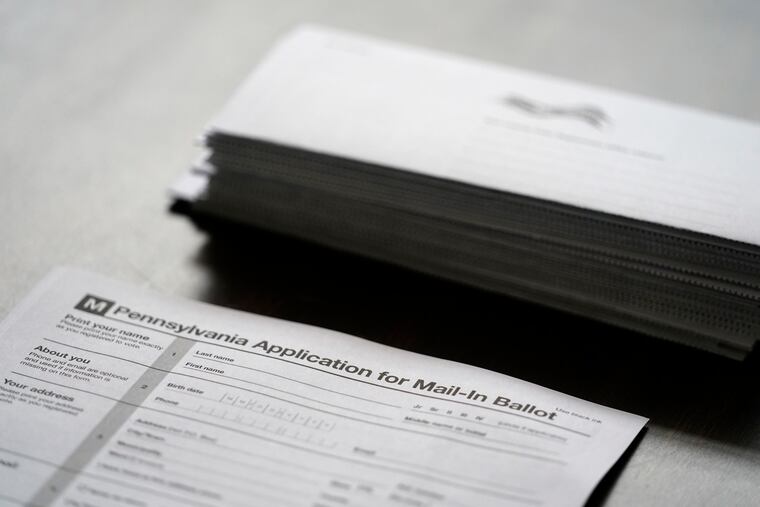Negotiations over changes to Pennsylvania’s mail voting law are showing signs of life
Closed-door talks on updating Pennsylvania’s fledgling mail voting law are showing signs of movement amid concerns over a dragged-out vote count in the presidential battleground state.

HARRISBURG, Pa. — Closed-door talks on updating Pennsylvania’s fledgling mail voting law showed signs of life Wednesday amid warnings that doing nothing will risk a dragged-out vote count in the high-stakes presidential election in the battleground state.
House Republicans held an internal conference call to discuss the idea of giving counties four or five days to process mail ballots before Election Day and to set down security requirements for the drop boxes that some counties are using to help collect mail-in ballots.
Leaders of the House and Senate Republican majorities declined interviews. Through a spokesperson, House Majority Leader Kerry Benninghoff (R., Centre) said the House Republican priority continues to be legislation that passed a month ago, nearly along party lines, and was met with a veto threat by Gov. Tom Wolf, a Democrat.
Wednesday's House Republican discussion did not involve elements of that month-old legislation opposed by many Democratic lawmakers and Wolf, such as lifting the county residency restriction on party or campaign representatives who observe inside polling places.
Another sticking point of that legislation is a provision outlawing the drop boxes and satellite election offices that are being used by many of the most heavily populated counties to help collect mail ballots, Democrats said.
Meanwhile, the top priority of counties is to get the ability to process mail ballots before Election Day — called pre-canvassing — as they face the prospect of digging into 3 million envelopes or more when polls open on Nov. 3.
Processing ballots before Election Day would speed up the vote count and give it more public credibility, county officials say, warning that a presidential election result otherwise could hang in limbo for days on a drawn-out vote count in Pennsylvania.
“We are in the position where the best thing we could do right now is to allow for four or five days of pre-canvassing, and some security stuff that can be put in there,” said Rep. Garth Everett (R., Lycoming). “But we just need to get it done.”
The talks are happening in the shadow of President Donald Trump’s claims at a recent rally near Harrisburg that the only way he can lose Pennsylvania to Democratic presidential nominee Joe Biden is if Democrats cheat, a claim he also made in 2016′s election.
In last week’s debate with Biden, Trump baselessly suggested that widespread election fraud is afoot in Philadelphia as he urged his supporters to serve as poll watchers and said he would not go along with an election result if he sees “tens of thousands of ballots being manipulated.”
» READ MORE: Trump has put Philly on the front lines of his attack on voting
Neither the House or Senate are scheduled to return to session until Oct. 19. Wolf administration officials want compromise legislation by mid-October, at the latest, to give counties time to incorporate the 11th-hour changes.
Rep. Russ Diamond (R., Lebanon) suggested that allowing pre-canvassing before Election Day and adding security requirements for drop boxes is a realistic avenue since drop boxes are already being used in some counties where ballots have been mailed out to people who applied for them.
“So are we going to change mid-stream?” Diamond asked.
Some House Republicans said they are angry at being accused by Democrats in recent weeks of trying to suppress the vote — particularly in the Democratic bastion of Philadelphia — during debates over election-related legislation in recent weeks.
“It’s very difficult in today’s hyper-politicized arena to move significant election reforms this close to an election,” said Rep. Jesse Topper (R., Bedford).
In the meantime, litigation over the mechanics of Pennsylvania’s election, vote counting and poll watching is pending in Philadelphia’s courts, the state Supreme Court, federal court in Pittsburgh and the U.S. Supreme Court.